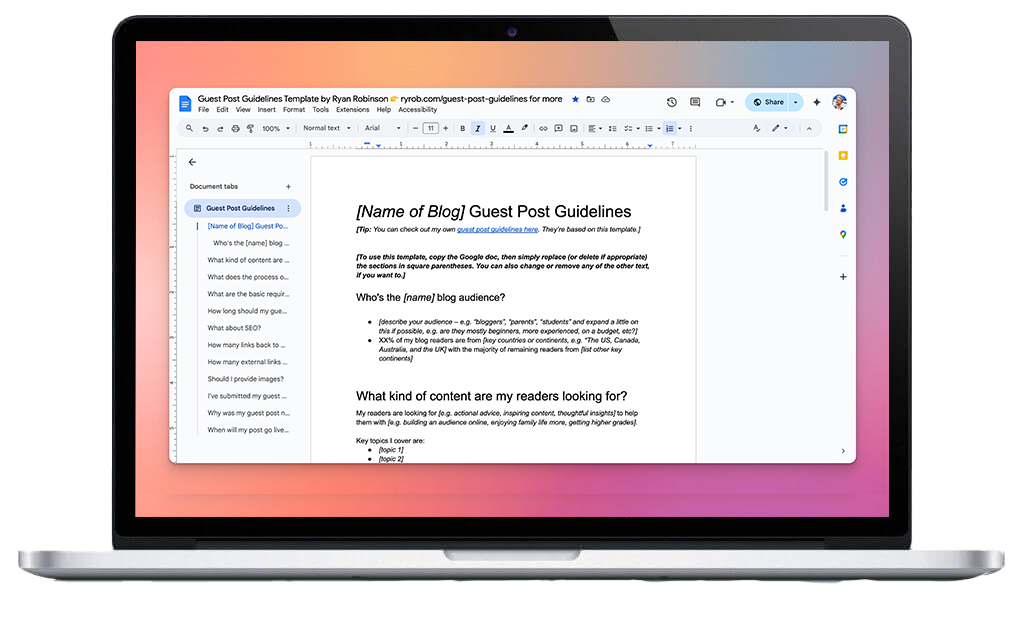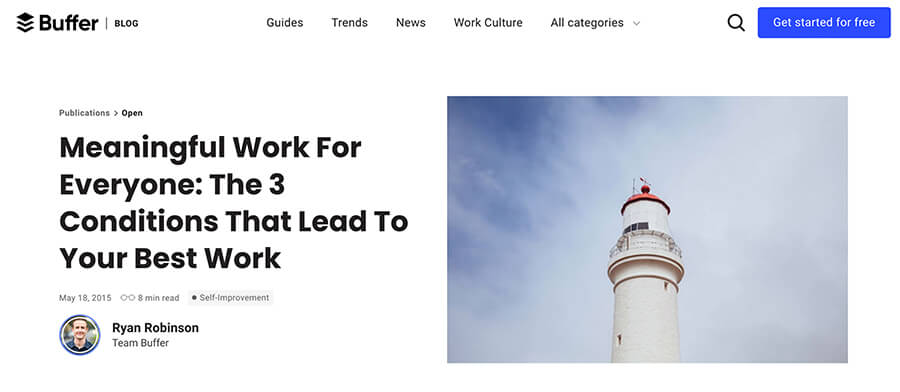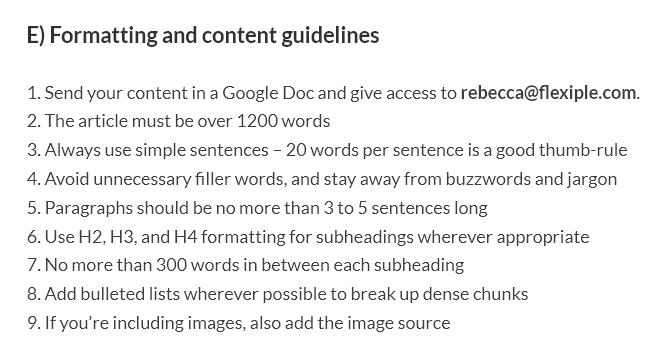Whether you’ve been blogging for a bit or you’re just getting started, you’ve no doubt heard about guest blogging—writing guest posts for other blogs in order to gain exposure to their audience—but what about accepting guest posts on your blog? Enter: My free guest post guidelines template you can snag today.
At some stage in your blog’s growth, you’re likely to start getting pitched by fellow bloggers, marketers, and website owners who’d like to guest blog for you. What’s great about guest blogging, is that it’s a win for everyone… as long as the content is great.
It can be tough to know what to say in response though, especially if you’ve never considered taking guest posts before.
- Should you be accepting guest posts on your blog or website?
- If you do, what guidelines should you set in order to make sure the content meets your standards?
In this guide, I’ll take you through everything you need to know about creating guest post guidelines and managing guest post submissions—including access to my free guest post guidelines template. This way, you can be confident that you’re only publishing high-quality content your readers will love.
Download My Free Guest Post Guidelines Template

Download my free guest post guidelines template that’s been used to for accepting high quality guest posts on my blog & with clients like LinkedIn, Adobe, Intuit, Close, Forbes, and more.
"*" indicates required fields
6 Smart Guest Post Guidelines: My Free Guest Post Guidelines Template & Examples
- What Are Guest Post Guidelines and Why Does Your Blog Need Them?
- Step 1. Use a Basic Template for Your Guest Post Guidelines
- Step 2. List the Topics You Want Guest Posters to Cover
- Step 3. Give Your Requirements for Post Length
- Step 4. Cover Any Formatting Requirements
- Step 5. Have a Clear Policy on Backlinks
- Step 6. Be Clear What You Offer in the Guest Post Bio
- How to Manage Guest Post Submissions Effectively
- 3 Tricky Questions About Accepting Guest Posts on Your Blog
Let’s start with the basics: What are guest post guidelines?
What Are Guest Post Guidelines and Why Does Your Blog Need Them?
Guest post guidelines are your rules for guest posters. While you might not need would-be guest posters to follow every single instruction to the letter, your guidelines are there to make sure that you receive the types of posts you want to publish, in the way you want to receive them.
If accepting guest blog posts becomes more work than it’s worth, you’ll burn out on this collaborative marketing channel.
What is Guest Blogging?
If you’re not 100% sure what guest blogging is, it’s when someone who isn’t the host blogger (or website owner/employee) has their work published on a blog. Take for example, this early guest post I wrote for the Buffer blog back in 2015:

Usually, guest posts are published for free. In some cases, brands will pay to have a guest post published on your blog—strictly speaking, this is a sponsored post, and you should disclose that to your readers.
Some blogs also pay their authors for writing guest posts. In this situation, you’re essentially paying a freelance writer to create content for your blog (which can be a great way to grow if you don’t have much time to write blog posts or dislike writing them). This can also help you cover blog topics that you don’t know much about, or produce content for your business that requires extra time and outreach, like case studies.
Should You Accept Guest Posts On Your Blog?
Not all blogs accept guest posts. For example, I don’t accept many guest posts here on my blog anymore—it’s something I only really offer to friends & cool people who’ve cultivated actual relationships with me over the course of months and years.

Should you accept guest posts on your blog?
- If your blog is on the newer side, you might prefer to keep it to just your voice and ideas for now. You could turn down all guest post offers, if you want.
- If you’re happy publishing guest content, it’s entirely up to you whether to accept or reject each post. You might limit guest posts to one or two per month, or you might set a high bar for what you’ll accept in terms of topic & quality.
Most bloggers won’t accept any piece of content that’s overly self-promotional or that appears to be designed purely for link building (getting backlinks to help promote a website in search engines).
What Do Typical Guest Post Guidelines Cover?
Guest post guidelines let would-be guest writers know things like:
- What topics the blog is looking for. Mini Traveller’s guidelines say “we accept posts that include tips for families, holiday ideas, days out etc, anything that is designed for kids.”
- How long the guest post should be. Friday.app’s guidelines say that posts “must be at least 2000 words in length.”
- Whether the guest blogger needs to include images, and any requirements about these. Mention.com’s guidelines state that the post “should include a minimum of three visual elements” and that these should not be stock images.
- How many links to their own site (or external sites in general) they can include in the guest post. Green and Prosperous’s guidelines explain that the guest blogger “can include up to 4 links in your post, in addition to one in your author bio.”
- The tone or style to use. WordStream’s guidelines ask for a “conversational, not corporate” tone.
- Whether the blog only accepts original content (this is the norm). Flexiple’s guidelines state that “only original, unpublished work” is accepted.
- What type of blog content isn’t accepted. Picmaker’s guidelines are very clear that authors should “refrain from linking to websites in categories such as dating, racing, gaming, betting, adult content, spammy webpages, etc.”
Why Create Guest Post Guidelines at All?
Creating guest post guidelines might seem like yet another task on a long to do list. You don’t have to come up with written guidelines, but you’ll find that going through this activity ultimately saves you a lot of time! Especially if you start with my free guest post guidelines template.
Without guidelines, you’ll get pitched a lot of posts that are much too short, off-topic, or otherwise unsuitable for your blog. You’ll end up doing a lot of back and forth asking for changes to guest blog posts.
Even a very simple set of guidelines can save you lots of time in having to repeatedly explain your requirements or rejecting unsuitable content.
How to Come Up With Your Guest Post Guidelines

It doesn’t need to take long to put together your guest post guidelines. You can get your guest post guidelines put together in just 10–15 minutes, using my template as a starting point.
Step 1. Use a Basic Template for Your Guest Post Guidelines
Whatever your blogging niche, you’re going to want to cover some basics in your guest post guidelines. That’s why I’ve created a template (based on my own guidelines for bloggers who want to guest post on RyRob.com) that you can use.
Download My Free Guest Post Guidelines Template

Download my free guest post guidelines template that’s been used to for accepting high quality guest posts on my blog & with clients like LinkedIn, Adobe, Intuit, Close, Forbes, and more.
"*" indicates required fields
You can create a copy of my free guest post guidelines template from that Google Doc and simply fill in the blanks as required to create your own guidelines.
Whether you use the template or not, the next few steps will take you through some crucial things to consider and include in your guidelines.
Step 2. List the Topics You Want Guest Posters to Cover
It’s obvious to you what topics your blog covers—but this might not be so obvious to guest posters. There may also be topics that you’ve written about a lot in your own content marketing, so you don’t want any guest posts on those right now.
Your guest post guidelines should set out the topics that you want contributors to cover. You could use a bullet point list, a single sentence, or even links to examples here.
If you’re not sure how to describe your topics, your blog’s category list could make a good starting point.
Example: WordStream’s Guest Post Topic Requirements

Note that WordStream not only lists the range of topics they do cover, like ecommerce and conversions, they also make it clear what they don’t cover: app and website development.
Step 3. Give Your Requirements for Post Length
Is your blog full of short, pithy posts or long, detailed guides? You likely have a preferred post length—and a length that your readers are used to, too.
You can ask guest posters to stick to a specific length. Most guidelines will give a range (e.g. “1,500–2,000 words”) or a minimum requirement (e.g. “at least 1,500 words”). If you publish short posts, you might instead give a maximum (e.g. “not more than 800 words”).
Example: Mini Traveller’s Guest Post Length Requirement

Step 4. Cover Any Formatting Requirements
Do you want to receive guest posts as Google docs? Will submitters need to upload their posts into WordPress? Should guest posters include images? How about screenshots? How should they format subheadings? These are all things to cover in your guest post guidelines.
Example: Flexiple’s Detailed Guest Post Formatting Guidelines

Step 5. Have a Clear Policy on Backlinks
One big reason to guest post is to get backlinks to your blog. It’s helpful to have a clear policy upfront for guest bloggers. Perhaps you’ll only allow highly relevant links, or you’ll limit external links in general. You might also want to consider links in the guest poster’s bio: are you happy for them to link to their website and social media accounts, or do you limit links here? Do you have any rules about anchor text?
Example: HubSpot’s Guest Post Rule for Backlinks

Step 6. Be Clear What You Offer in the Guest Post Bio
One key part of guest posts is the “bio” that appears at (usually) the end of the post. This is key for many guest writers’ digital marketing strategy: their bio lets them promote their company or product to readers.
If you have specific requirements for the bio, make these clear upfront. For instance, you might ask for a headshot to go alongside it, for all bios to include specific social media links (e.g. LinkedIn), or for the bio to avoid linking directly to landing pages or sales pages.
Example: Jolt.io’s Guest Post Requirements for the Bio

How to Manage Guest Post Submissions Effectively
Dealing with guest post submissions can take a lot of time. If you start to get multiple submissions every week—or even every day—then you’ll need a good system for handling them.

Here are my key rules for managing guest blog post submissions:
1. Turn Down Submissions if the Initial Approach is Poor
It may seem a little harsh … but if someone sends you a very generic topic idea in a poorly-written email with any typos, chances are, their guest post will be of poor quality too.
Save yourself some time and turn them down right away. As the blog owner, you have every right to turn down a guest post at any stage.
2. Label or Tag Guest Post Submissions in Your Email Account
To make it easy to track guest post submissions, it’s helpful to tag or label them in your email account. That way, you can set aside time to look through multiple submissions at once. This also reduces the chances of losing someone’s submitted post.
3. Check the Guest Post Content is Unique
Unless you accept previously published content (most blogs don’t), then you need to make sure that the content is unique. A quick Google search for a sentence or two from the post should turn up anything suspiciously similar.
If the poster is using some content from their own blog or someone else’s blog, that should be acknowledged with an appropriate attribution (e.g. by putting the content in quotes and linking to the original).
4. Let Submitters Know Likely Timescales
If you want to avoid would-be guest posters following up with you every few days, give them a clear timescale upfront. If it usually takes you 4 weeks to review and get back to submitters, then say so. You might even want to include this in your guest post guidelines. The same goes for how soon their post will be published: if you’re currently scheduling posts 3 months out, again, let submitters know.
5. Schedule Guest Posts into Your Content Calendar in Advance
Just like your regular blog posts, guest posts should go into your content calendar (sometimes called an editorial calendar). That makes it easy to let guest posters know what day you plan to publish their post, so they can look out for comments.
3 Tricky Questions About Accepting Guest Posts on Your Blog

I’ve worked on both sides of the guest blogging world for over a decade—here are the most common questions that come up.
Should You Charge for Guest Posts? (Sponsored Posting)
Brands, and SEO agencies working with brands, often want to guest post in order to build links or to gain greater brand awareness. In this case, they pay for the guest post (which is generally called a “sponsored post”) as a form of advertising.
Some blogs only accept sponsored posts: all guest posts have to be paid for. Other blogs don’t ever accept money for guest posts. And some blogs judge this on a case-by-case basis.
It’s up to you what you choose to do on your blog. I’d recommend that if you do charge for guest posts, you make sure that content is up to the usual standard of your site—even if that means you heavily edit it.
What if Someone Doesn’t Follow the Guest Post Guidelines?
Let’s say you get a good submission from a blogger who’s clearly ignored your guidelines. Perhaps their guest article is much shorter or longer than you want, or they haven’t included things you’ve asked for, like images.
Should you still consider the post or should you discount it automatically?
Personally, I’d still consider accepting it if the content is of a good standard. You could ask the blogger to revise their submission to meet your guidelines or point out specific things you need from them in order to publish their post.
Should You Let Someone Guest Post More Than Once?
Some guest authors will vanish off your radar as soon as they’ve written a post and seen it published on your blog. Others might follow up and ask to write another post for you.
Should you let them?
If working with them was a good experience, and their post went down well with your readers, go ahead and publish another post from them. Equally, if you’re trying to feature a wide range of guest posters and you don’t want any individual’s voice to become too dominant, it’s also fine to politely turn them down—or to explain that their post may have to wait a few months to be published.
Create Your Guest Post Guidelines and Start Featuring Great Guest Content on Your Blog
Accepting guest posts can be hugely beneficial to your blog. It’s a great way to give your readers expert insight or a different perspective on a topic in your niche. Plus, guest posters can help you to keep up a steady stream of content during a busy time.
Publishing guest posts is also an excellent way to get to know fellow bloggers, building up relationships that could help you grow your blog in the years to come.
My guest post guidelines template makes it quick and easy to come up with your own set of guidelines, so give it a try today. If you’d also like to have a go at guest blogging yourself, then check out my detailed guide on how to guest blog.
Download My Free Guest Post Guidelines Template

Download my free guest post guidelines template that’s been used to for accepting high quality guest posts on my blog & with clients like LinkedIn, Adobe, Intuit, Close, Forbes, and more.
"*" indicates required fields

34 replies to “6 Smart Guest Post Guideline Template Essentials: Free Template, Examples & Best Practices”
Excellent breakdown of guest post essentials! Having structured templates streamlines the process and ensures high-quality, consistent content. Definitely a useful tool for both publishers and writers.
Such a helpful guide! I love how clear and practical the tips are. The free template makes it even easier for bloggers to get started. Thanks for sharing!
very insightful.
Excellent clarity! Clearly outlines expectations, tone, structure, and submission rules—perfect for anyone planning a guest post.
This blog is very informative and useful, thank you!
Great insights, Ryan! These guidelines are a must-read for anyone serious about guest posting. I especially appreciate the emphasis on building relationships—it’s often overlooked. Thanks for sharing!
This is an exceptionally clear and well-structured set of guest post guidelines. The emphasis on originality, value-driven content, and proper formatting reflects a strong commitment to quality. Thanks for sharing such a detailed and practical framework!
This is incredibly helpful—especially for niche blogs like mine focused on pet care and animal health. Clear guest post guidelines save so much time and help attract writers who actually match your audience’s needs. I’ll definitely be using your template to refine my own submission process. Thanks for sharing these best practices!
These guest post guidelines are really helpful—clear, concise, and practical for both writers and publishers. A solid template for guest contributions.
This blog is very informative, Good content. thank you!
Insightful post! These guest post guideline templates are super helpful for maintaining quality and consistency. A great resource for bloggers and content marketers alike! Clear guidelines not only save time but also help attract high-quality contributors who align with your brand’s tone and goals. Definitely bookmarking this for future reference!
Thanks. Really, it is so helpful for me.
Great insights! I really appreciate how clearly you explained the role of AI in marketing. It’s impressive to see how technology is transforming digital strategies. Looking forward to more updates like